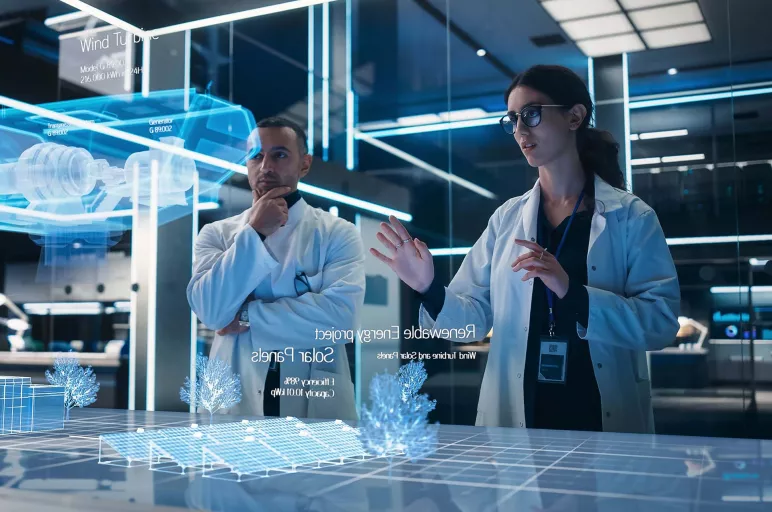
How Generative AI is Reshaping Manufacturing
- Generative AI in manufacturing offers unprecedented opportunities for innovation in product design, process optimization and supply chain management.
- Challenges to adoption of generative AI include data quality issues, integration complexities and skill gaps.
- Implementing generative AI can provide significant competitive advantages in efficiency, decarbonization goals and market responsiveness.
July 02, 2024 | Supply Chain Software
Generative AI stands apart from all other technologies as a transformative force with the potential to revolutionize various aspects of manufacturing. Using machine learning algorithms, particularly deep learning and neural networks, GenAI is an invaluable strategy for manufacturers looking to stay competitive in an increasingly complex global market.
From revolutionizing product design to optimizing supply chains, the potential applications are vast and varied. But widespread adoption will not be without obstacles. Manufacturers must navigate challenges in terms of data management, system integration, skill development, and ethical considerations in order to fully leverage the power of AI.
Scope of Generative AI in Manufacturing
Generative AI yields output based on patterns and insights gleaned from vast amounts of data. For the manufacturing domain, it opens up unprecedented opportunities for innovation and efficiency — applicable to aspects such as product design, process optimization, quality control and supply chain management.
Let’s take a look at the potential applications of GenAI in manufacturing:
Product Design and Development
Generative AI can rapidly create and recreate product designs, considering multiple parameters such as performance requirements, manufacturing constraints and cost factors. This capability significantly accelerates the design process for manufacturers, leading to innovative solutions that human designers might not have conceived.
Process Optimization
By analyzing vast amounts of production data, generative AI can suggest optimized manufacturing processes — including machine settings, production schedules and resource allocation. This leads to increased efficiency, reduced waste and improved overall productivity.
Quality Control
Generative AI can be used to create sophisticated models for predicting and detecting defects in real time. It can also provide optimal inspection strategies, ensuring higher product quality while reducing the time and cost associated with quality control processes.
Predictive Maintenance
By generating models that can predict equipment failure, GenAI use can enable manufacturers to implement proactive maintenance strategies, reducing downtime and extending the equipment lifespan.
Supply Chain Management
Generative AI can create models for demand forecasting, inventory optimization as well as risk assessment — enabling manufacturers to effectively navigate complex global supply chains.
Decarbonization
Generative AI can steer decarbonization efforts with its ability to design more environment-friendly products and processes requiring minimum energy, thereby reducing the overall environmental impact of manufacturing operations.
Challenges to Adoption of Generative AI
Despite its immense potential, the adoption of generative AI in manufacturing faces several challenges. Data quality, system integration, and cost of acquisition and implementation remain the primary concern areas for manufacturers, but there are other factors that act as deterrent to the adoption of GenAI:
Skill Gap
There’s a significant shortage of professionals with the required skillsets to develop, implement, and maintain generative AI systems in manufacturing — and this can paralyze the pace of adoption and limit the effectiveness of AI initiatives.
Ethical and Legal Considerations
As generative AI becomes more prevalent in manufacturing, questions will continue to arise on intellectual property rights, liability for AI-generated designs or decisions, and the ethical implications of AI-driven automation on the workforce.
Trust
Manufacturers could take time to apply AI-generated designs or decisions, particularly in critical situations. Some AI models lack transparency, and this could act as a limiting factor in justifying their output. This could also be a cause for concern in regulated industries.
Change Management
Adopting generative AI often requires significant changes to pre-existing processes and workflows. Overcoming resistance to change and ensuring smooth transitions can be challenging for many enterprises.
Generative AI in Manufacturing Probable Use Cases
Consider a scenario where an automotive manufacturer wants to design a new electric vehicle with improved aerodynamics, energy efficiency, and at the same time wants to reduce production costs. Generative AI’s application can be used for design generation, performance simulation, cost analysis followed by design iteration based on the results and cost analysis. Thereafter, AI can provide required sets of optimized designs that balance all the aforementioned aspects.
For predictive maintenance and quality control in high-tech industries, manufacturers can utilize advanced capabilities of generative AI for data integration, pattern recognition from historical data, predictive modeling based on patterns, as well as real-time monitoring and alerts.
Conclusion
GenAI has the ability to drive major improvements in product design, operational efficiency, as well as supply chain management in the manufacturing sector — which could translate into tangible business benefits and competitive advantages.
The future of manufacturing will likely be shaped by the synergies between human expertise and AI-generated insights and solutions. It will enable manufacturers to not only enhance their current operations but also unlock new possibilities to create value and drive progress. Going forward, staying informed about developments in generative AI will be key to finding innovative ways to integrate this technology into manufacturers’ strategic plans for the future.



